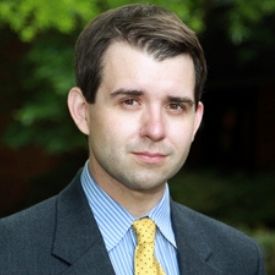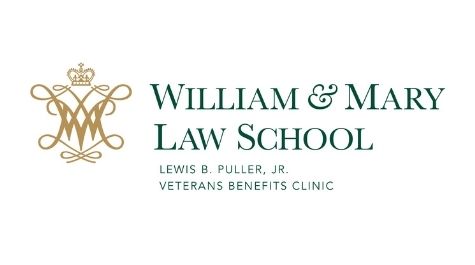The Puller Veterans Benefits Clinic: Q&A with Co-Director Caleb R. Stone '15
Q&A with Clinic Co-Director Caleb R. Stone
 Since the Puller Clinic accepted its first clients in January 2009, William & Mary law students, working under the supervision of managing attorneys, have assisted hundreds of veterans affected by service-connected disabilities receive the benefits they deserve. The generosity of the J.D. Classes of 1974 and 1984 and many other donors has enabled the Clinic to provide students with valuable skills training and assist veterans on a pro bono basis.
Since the Puller Clinic accepted its first clients in January 2009, William & Mary law students, working under the supervision of managing attorneys, have assisted hundreds of veterans affected by service-connected disabilities receive the benefits they deserve. The generosity of the J.D. Classes of 1974 and 1984 and many other donors has enabled the Clinic to provide students with valuable skills training and assist veterans on a pro bono basis.
Two Law School alumni - Professor Caleb R. Stone ’15 and Visiting Professor Michael Dick ’06 serve as Clinic Co-Directors.
The Clinic was named in honor of alumnus Lewis B. Puller, Jr. (1945-94), an officer in the U.S. Marine Corps, attorney and Pulitzer Prize-winning author. He received an undergraduate degree from William & Mary in 1967 and a J.D. from William & Mary Law School in 1974.
Why do veterans come to the Clinic? What kind of assistance do you offer?
Veterans contact the Clinic because they want compensation for medical conditions that are somehow related to active duty military service. The Clinic litigates cases in the Department of Veterans Affairs disability compensation system. Our clients usually come to us after something has gone wrong in the process, and they hope that we can change the results in their favor. We get involved in complicated matters that need attorney intervention to have any real chance of ending positively. We take all kinds of cases, but we probably have a disproportionate number of claims that involved Post-Traumatic Stress Disorder, Military Sexual Trauma, or Traumatic Brain Injury. Over the years, we’ve built up an expertise on these issues, and they can be some of the most difficult claims to win in this system.
What coursework is a pre-requisite for students to enroll in the Clinic? Do you get a fair number of students with a military background or from military families participating in the Clinic?
There aren’t any pre-requisites for taking the Clinic, though students can’t participate until after they’ve finished their first year of law school. While a significant percentage of our students have served in the military, the clear majority have not. This is not unexpected given U.S. demographics—as of 2018, approximately seven percent of Americans are veterans of the armed forces. Our student active duty/veteran participation is higher than that, but we also have had many students with only secondary connections to the military (e.g., through family members).
What is the student experience in the Clinic?
We begin the semester by making students go through an intensive all-day training session during the first week of classes covering Clinic procedures and VA disability compensation law. Students then receive their case assignments at the start of the second week. It is up to them to figure out what has happened in the past—in large part by looking at the relevant files and reading transition memorandums left by previous students—and what they need to do to move the cases forward. They meet with professors at least once a week in teams to receive guidance and consider potential actions to take. We expect the students to “drive the bus” in these cases—they are the ones advocating before the VA in writing. They also act as “the face” of the Clinic to our clients.
VA Disability Compensation law is difficult to master, and the entire system is slow to operate. Students build on the work that has come before them and that will continue after they’ve departed the Clinic. They have to be prepared to deal with different people and issues at various stages of a long process. Some students get to advocate in a hearing; others write to decisionmakers at the Regional Benefits Offices. Yet other students get to write briefs to judges at the Board of Veterans’ Appeals or the Court of Appeals for Veterans Claims. Every student who’s come through has had a unique experience, and all of them operate as one link in a long chain that we hope leads to victory.
In short, we’re all about two things: teaching students and getting veterans paid for medical conditions related to military service.
What do you want students to learn in the Clinic?
Although many of our students will go on to practice in this arena of law full-time or pro bono, others don’t touch these issues again after graduation. Either way, these skills are entirely transferrable in any context. Good lawyers need to write well, and we’re giving students a crash course in putting that skill to use. Good lawyers must also deal with clients effectively, no matter what they might be like, and students get a lot of that critical practice by working with us. We want students to become comfortable with ever-changing and complicated facts, and those are certainly not in short supply. Finally, we help students consider issues thoroughly, plan carefully, and think critically.
Can you quantify the Clinic’s impact?
By our calculations, our clients have won over 500 claims and received over $6.5 million in past due benefits. Veterans are paid based on the date of a claim, not when the VA grants benefits. That is important because these cases can take years to resolve. Additionally, our clients have gained over $53 million in lifetime expected benefits. We have also helped over 450 people on a limited engagement basis through our Military Mondays program since 2015. Through Military Mondays, we’re able to help some veterans by giving them advice for an hour on their claims without assuming permanent representation. While we’ve been performing these appointments via teleconference since the start of the Coronavirus Era, we are hopeful that we will be able to return to having them at their usual Starbucks location in Williamsburg soon.
Where does the Clinic’s financial support come from?
The Law School provides physical space for us in the building. The Clinic is otherwise partially—though not entirely—dependent on private donations to fund our operations and accomplish our mission.
Why did you want to return to the Clinic after you graduated from the Law School?
I thought that the clinical programs were by far the most meaningful part of my law school experience—so much so that I took 15 credits worth of them. I didn’t imagine that I could continue in this endeavor as a career. But when the opportunity arose, getting involved again was an easy decision. I’m incredibly fortunate that the Clinic was hiring an Equal Justice Works Fellow after I graduated. It’s been a blessing to mentor and teach students in the same ways that I was helped years ago.
Finally, working with real people with real problems has always motivated me to put immense effort into what I do. For example, I had one client as a student, then continued to work on his case as an attorney after I returned. We worked on his case for about eight years. He went from having nothing to being rated permanently and totally disabled. He credited us with saving his life. I often think about life-changing victories like that whenever I’m experiencing the frustrations involved with navigating the bureaucracy. They make what we do worth it.
About William & Mary Law School
Legal education in a university setting began at William & Mary in 1779. Now in its third century, America's first law school continues its historic mission of educating citizen lawyers who are prepared both to lead and to serve.
